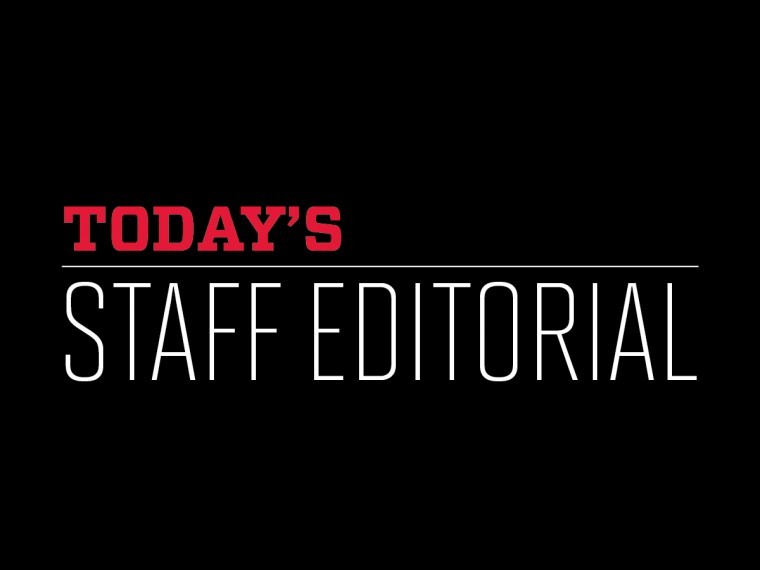It’s Time to Go vote for next year’s SGA executive board, a group of students who play a key role in advocating for undergraduates on this campus. This election, the mere 2,000 who usually choose to vote have to decide between presidential incumbent Samantha Zwerling and her Go Party team, and newcomer Noah Robinson and his fellow Time Party candidates.
Both parties have been highly visible on social media this year — a notable difference from previous campaign — making it that much easier to see the distinct differences between the two proposals. The candidates’ platforms, tweets, Facebook posts, videos, debates and individual interviews with this editorial board have all factored into our decision about which candidates to endorse.
Robinson’s campaign has relied heavily on overarching, crowd-pleasing initiatives, such as changing parking tickets and dining points. The Time Party campaign has tried to appeal to a greater majority of the student body by using the popular meme phrase “Ain’t nobody got TIME for that” to emphasize these broad issues. Our issue with Robinson is similar to one we had with last year’s For Party presidential candidate: His plans lack substance.
Vague ideas are not the way to get things done — and Zwerling has proven that over this past year.
In 2012, Zwerling’s 50-page election platform seemed overly ambitious. This editorial board commended Zwerling for her comprehensive plan, but even in that endorsement, we were skeptical she would be able to accomplish more than a small percentage of what her plan outlined.
But we have been pleasantly surprised with her success in transforming both the inner workings of the Student Government Association and its communication with, and advocacy for, its constituents — students.
Zwerling shrank her platform down to 26 pages this year in a pledge to finish what she started last spring, and she has learned what can feasibly be accomplished; as she has repeatedly stated, last election’s behemoth agenda was a two-year plan.
And Zwerling was able to complete many of those initiatives. Shortly after she was elected SGA president, Zwerling spent her summer making connections with university administrators and different city and state officials. She cites her well-developed network as one of the reasons she has been able to accomplish more as the year has progressed. Strengthening these relationships and ensuring these officials trust her has been a main goal throughout her tenure, and she has created an arrangement that benefits the students: People listen to her, and she’s advocating what’s best for our community.
Textbook reform, Dean’s Student Advisory Councils, lobbying in Annapolis and Washington, community outreach, mental health services and general college affordability have all been areas in which Zwerling has made significant progress since her inauguration.
She has consistently worked toward adopting open-source textbooks — an exceptionally useful and just initiative that Robinson’s campaign actually disparages. Her administration hosted successful rallies for both same-sex marriage and the DREAM Act — both of which got passed by referendum in this state on Election Day. She created What to Fix UMD, an innovative way of directly receiving student feedback that university departments have closely followed.
Zwerling and the SGA helped secure $5 million of funding over the next 10 years for mental health services to hire new staff members and better respond to increasing student demand. She has been working to get the sexual assault education mandate passed through the University Senate. And she told this editorial board, “College affordability is my top priority.”
We have full confidence Zwerling will accomplish a significant portion of her goals — and looking at the Go Party platform, it’s easy to see just how she can pull it off. The 26 pages of “Problem … Here’s How It’ll GO,” explicitly outline how she and her party will solve each issue.
The Time Party has a similar format for its platform, with “Problem … Story … Solution,” as its three branching points. The difference is the Go Party’s initiatives are actually plausible. The Time Party is setting out to resolve a number of issues, from noisy construction to overpriced textbooks to Facilities Management, Dining Services and Department of Transportation Services issues. But it’s unclear if Robinson realizes the SGA has limited authority to effect such change or that the issues are already being addressed by initiatives such as WTF UMD.
Robinson has belittled Zwerling’s lobbying efforts in Annapolis as beyond the purview of an SGA president. He has mocked open-source textbooks, which have the potential to ease the hit on almost every student’s wallet. Robinson has committed to sexual assault prevention (very vaguely) in his campaign, yet he was “released from his position” at the Sexual Assault Response and Prevention Program, according to SARPP assistant coordinator Stephanie Rivero.
He wants to audit DOTS and Dining Services, two of the largest departments at this university, and he does not seem to realize the enormity of that task. He has revealed himself to be the creator of Facebook page Maryland Compliments and claims WTF UMD sends a negative vibe through the campus, but he fails to acknowledge what WTF UMD has accomplished in its few months of existence.
Like Zwerling herself, the entire Go Party ticket is the obvious choice in this year’s election. Vote for Meenu Singh for academic affairs vice president, Andrew Aggabao for financial affairs vice president and Josh Ratner for student affairs vice president.
Singh has a strong grasp on her position and what she wants to do, whereas the Time Party’s Stephanie Graf failed to match the Go Party’s comprehensive plan with innovative ideas of her own during the SGA debate. Aggabao is coming from outside the SGA, which could potentially bring new light to the position. Ratner, who was a student liaison for the city council, already has invaluable experience dealing with bureaucracy and would be ready to launch his initiatives from Day One. Plus, Zwerling said the Go platform was a compilation of ideas from everyone on the ticket.
Students need to understand how important it is to vote in this election. The Time Party makes a good point by saying there are 25,000 students at this university, yet barely 2,000 usually vote. Today’s the second day of voting on Testudo — polls close at 5 p.m. tomorrow. These votes directly affect us because these candidates’ initiatives would impact each of us individually.
Samantha Zwerling has accomplished more than any SGA president this editorial board has seen. She deserves your vote so she can finish what she started.





